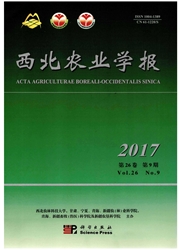

 中文摘要:
中文摘要:
采用水培法收集南美蟛蜞菊(Wedelia trilobata)根系分泌物,GC-MS分析鉴定得出其根系分泌物中存在邻苯二甲酸二异丁酯、硬脂酸甲酯、棕榈酸甲酯和邻苯二甲酸二异辛酯。采用不同质量浓度硬脂酸甲酯和棕榈酸甲酯对玉米、黄豆、黄瓜、水稻4种农作物种子进行处理,以探究硬脂酸甲酯和棕榈酸甲酯对4种农作物种子萌发和幼苗生长的影响,进而分析这2种物质的化感潜力。结果表明,质量浓度为0-2 000mg/L时,这2种物质均呈现出不同程度的化感作用,均可在一定程度上抑制玉米、黄豆、黄瓜、水稻的发芽势、发芽率、发芽指数和活力指数。其中,硬脂酸甲酯对黄豆的胚根、胚芽的生长无显著的影响,但对玉米、黄瓜、水稻的胚根、胚芽的生长均有显著的抑制作用;棕榈酸甲酯对这4种作物胚根、胚芽的生长均有显著的抑制作用。
 英文摘要:
英文摘要:
The root exudates of Wedelia trilobata were collected through water culture method and then diisobutyl phthalate, methyl stearate, methyl palmitate and 1,2-Benzenedicarboxylic acid, bis(2- ethylhexyl) ester were identified via GC-MS. Maize, soybean, cucumber, and rice were chosen and treated with simulated gradient concentrations of methyl stearate and methyl palmitate (0, 250, 500, 1 000, 2 000 mg/L) in order to exudates of W. trilobata on the showed that the two substances insights into the allelopathic effects of the two substances in the root d germination and growth of maize of those four plant. Results ld present allelopathic effects with different levels. Both the two substances all posed negative effects on the germination rates, germination potential, germination in dex, and germination vitality index of maize, soybean, cucumber, and rice. Methyl stearate did not give significant effects on the growth of soybean seeding, but it afforded negative effects on the growth of maize, cucumber, and rice seeding significantly. Meanwhile, methyl palmitate had inhibitory effects on the growth of the four kinds of crops significantly.
 同期刊论文项目
同期刊论文项目
 同项目期刊论文
同项目期刊论文
 Photocatalytic properties of zinc sulfide nanocrystals biofabricated by metal-reducing bacterium She
Photocatalytic properties of zinc sulfide nanocrystals biofabricated by metal-reducing bacterium She Human impacts on genetic diversity and differentiation in six natural populations of Madhuca hainane
Human impacts on genetic diversity and differentiation in six natural populations of Madhuca hainane Insights into the differences in leaf functional traits of heterophyllous Syringa oblata under diffe
Insights into the differences in leaf functional traits of heterophyllous Syringa oblata under diffe Local adaptation and phenotypic plasticity both occurred in Wedelia trilobata invasion across a trop
Local adaptation and phenotypic plasticity both occurred in Wedelia trilobata invasion across a trop 期刊信息
期刊信息
